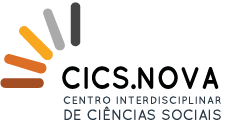- CICS.NOVA
- Pessoas
- Investigação
- Observatórios e Laboratórios
- Formação Avançada
- CICS.NOVA Edições
- Comunicação de Ciência





Newsletters

NEWSLETTER - 28/2020
25 de Setembro 2020
Urban tourism in the times of the COVID-19 pandemic

Encontra-se aberta a chamada para capítulos para o livro Urban tourism in the times of the COVID-19 pandemic, editado por Jorge Sequera (UNED) e Jordi Nofre (CICS.NOVA).
Prazo para submissão de resumos: 26 de Março de 2021
The development and distribution of an effective and safe vaccine against COVID-19 show us a light at the end of the tunnel. Since the outbreak of coronavirus until the current encouraging situation, the public powers have responded to the pandemic by deploying a battery of measures such as severe mobility restrictions, isolation, quarantines, social distancing, and night-time curfews in most countries of the Global South, the Global East, and the Global North. As a result of COVID-related restrictions, urban tourism has dropped sharply in many cities worldwide. An increasing number of voices across the world have expressed their concerns regarding the profound consequences that the current situation may have for the urban tourism and related activities. An example of the consequences driven by the current circumstances of the pandemic include the progressive destruction of thousands of jobs, and the consequent growing financial imbalance of many businesses. On the other hand, we should also mention the wide range of impacts on the urban fabric, such as new forms of segregation (including biopolitical forms of segregation); the extreme tertiarisation of housing; the homogenisation of urban space and its monofunctionalisation strongly oriented towards tourism; the evictions; the disappearance of traditional local retail stores. However, other tourism-related problems that exert pressure on central areas of our cities (e.g., worsening of community livability, conflicts in the public space during nighttime hours, etc.) have abruptly ceased during the pandemic. Undoubtedly, all of this introduces a higher level of complexity when it comes to conducting research into the range of potential spatial, social, economic and cultural changes that the current pandemic has produced in global cities, and those that it may continue to produce in the short- and mid-term future.
“Urban tourism in the times of the COVID-19 pandemic” therefore aims to explore the number of multifaceted spatial, social, economic and cultural changes that urban tourism in the Global South, Global East and Global North has experienced (and will face) as a consequence of the COVID-19 pandemic. This call for chapters therefore wishes to encourage contributions relating to one or more of the following research topics:
1. The fragility of urban tourism in socio-(bio)environmental crises (natural disasters, pandemics, climate change, etc.) and social crises (wars, revolts, social mobilisation, armed conflicts, etc.)
2. Constructed tourist imagery and its deconstruction in times of pandemic
3. The rise and fall of urban tourism. What’s next?
4. The new movements of transnational tourism corporations and the links between financial capital, hotel companies and platform economies (Uber, Deliveroo, etc.)
5. Transformations of tourist consumption, public space and the (de)airbnbisation of cities
6. Urban segregation, labour precarity and new social geographies in tourist cities
7. New urban conflicts in tourist cities and regulatory responses to the pandemic
8. The chronotopias of tourism and the ‘aseptic’ city
Editors of a book series published with a reputable international academic publisher have already expressed an interest in this edited book project. For this reason, our edited book “Urban tourism in the times of the COVID-19 pandemic” will take into account, as a priority, empirical research chapters that have made a significant effort to update and adapt their fieldwork to the current situation. Please send your abstract (500 words max.) to Jorge (jorgesequera@poli.uned.es), with Jordi (jnofre@fcsh.unl.pt) in cc, by no later than 26 March, 2020.
Submission timeline:
Submission of chapter abstracts: 26 March, 2021
Communication of acceptance or rejection: 9 April, 2021
Submission of full manuscripts (around 6,000 words) to Editors: 4 October, 2021
NOVA FCSH
 Colégio Almada Negreiros | Campus de Campolide
Colégio Almada Negreiros | Campus de Campolide
3.º piso - Sala 333
1070-312 Lisboa
Portugal

Financiado por FCT/MEC através de fundos nacionais e quando aplicável co-financiado pelo FEDER no âmbito do acordo de parceria PT2020
Concepção e Desenvolvimento: Plug & Play






